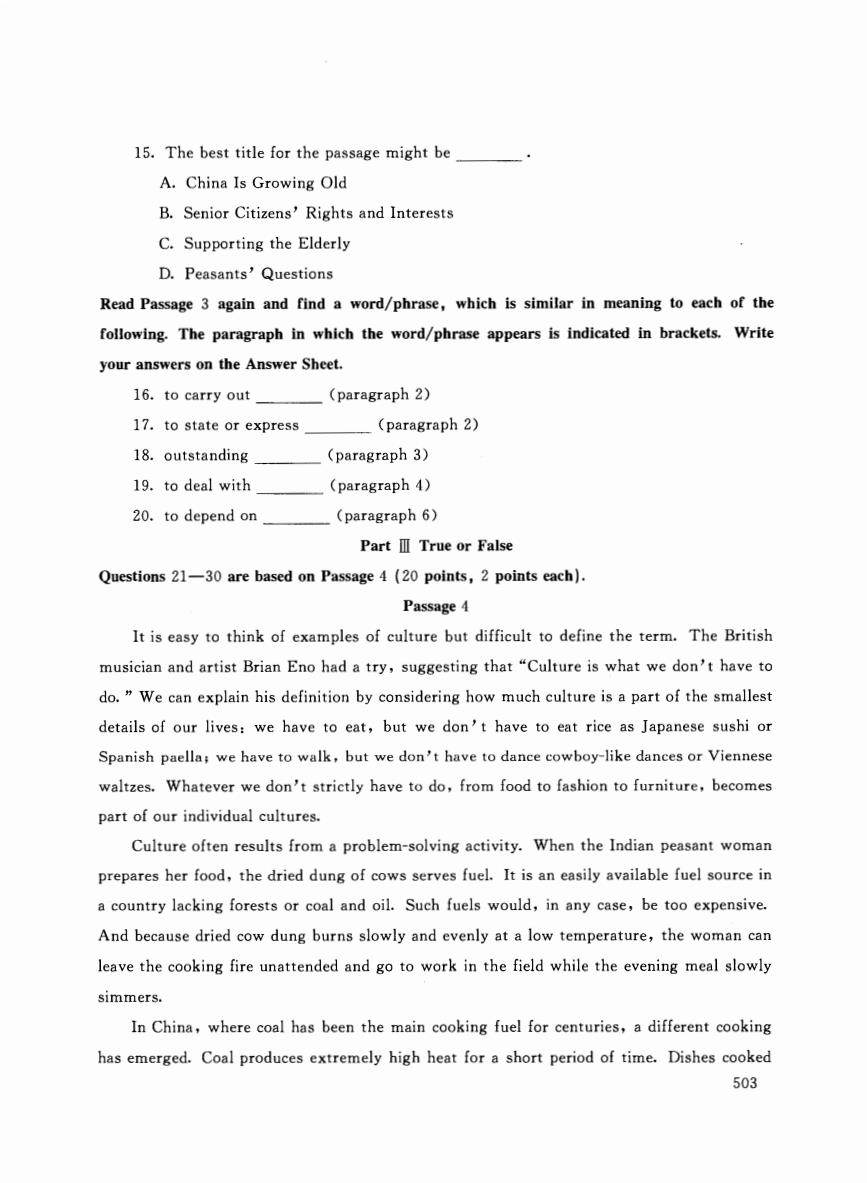正在加载图片...

15.The best title for the passage might be A.China Is Growing Old B.Senior Citizens'Rights and Interests C.Supporting the Elderly D.Peasants'Questions Read Passage 3 again and find a word/phrase,which is similar in meaning to each of the following.The paragraph in which the word/phrase appears is indicated in brackets.Write your answers on the Answer Sheet. 16.to carry out (paragraph 2) 17.to state or express (paragraph 2) 18.outstanding (paragraph 3) 19.to deal with (paragraph 4) 20.to depend on (paragraph 6) PartⅢTrue or False Questions 21-30 are based on Passage 4(20 points,2 points each). Passage 4 It is easy to think of examples of culture but difficult to define the term.The British musician and artist Brian Eno had a try,suggesting that "Culture is what we don't have to do.We can explain his definition by considering how much culture is a part of the smallest details of our lives:we have to eat,but we don't have to eat rice as Japanese sushi or Spanish paella;we have to walk,but we don't have to dance cowboy-like dances or Viennese waltzes.Whatever we don't strictly have to do,from food to fashion to furniture,becomes part of our individual cultures. Culture often results from a problem-solving activity.When the Indian peasant woman prepares her food,the dried dung of cows serves fuel.It is an easily available fuel source in a country lacking forests or coal and oil.Such fuels would,in any case,be too expensive. And because dried cow dung burns slowly and evenly at a low temperature,the woman can leave the cooking fire unattended and go to work in the field while the evening meal slowly simmers. In China,where coal has been the main cooking fuel for centuries,a different cooking has emerged.Coal produces extremely high heat for a short period of time.Dishes cooked 50315. The best title for the passage might be 一一一一一一· A. China Is Growing Old B. Senior Citizens' Rights and Interests C. Supporting the Elderly D. Peasants' Questions Read Passage 3 again and find a word/phrase , which is similar in meaning to each of the following. The paragraph in which the word/phrase appears is indicated in brackets. Write your answers on the Answer Sheet. 16. to carry out 一一一一一 (paragraph 2) 17. to state or express 一一一一一一 (paragraph 2) 18. outstanding_一一一一 (paragraph 3) 19. to deal with 一一一一一一 (paragraph 4) 20. to depend on 一一一-一一一 (paragraph 6) Part III True or False Questions 21-30 are based on Passage 4 (20 points, 2 points each). Passage 4 It is easy to think of examples of culture but difficult to define the term. The British musician and artist Brian Eno had a try , suggesting that "Culture is what we don't have to do. " We can explain his definition by considering how much culture is a part of the smallest details of our lives: we have to eat , but we don' t have to eat rice as J apanese sushi or Spanish paella; we have to walk , but we don' t have to dance cowboy-like dances or Viennese waltzes. Whatever we don't strictly have to do , from food to fashion to furniture , becomes part of our indivídual cultures. Culture often results from a problem-solving activity. When the lndían peasant woman prepares her food , the dried dung of cows serves fuel. It is an easily available fuel source in a country lacking forests or coal and oil. Such fuels would , in any case , be too expensive. And because dried cow dung burns slowly and evenly at a low temperature , the woman can leave the cooking fire unattended and go to work in the field while the evening meal slowly SI lers. In China , where coal has been the main cooking fuel for centuries, a different cooking has emerged. Coal produces extremely high heat for a short períod of time. Dishes cooked 503